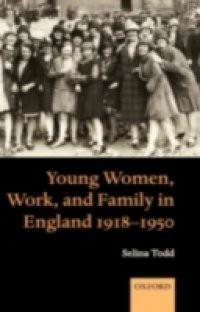This fascinating account of young women's lives challenges existing assumptions about working class life and womanhood in England between the end of the First World War and the beginning of the 1950s. While contemporaries commonly portrayed young women as pleasure-loving leisure consumers, this book argues that the world of work was in fact central to their life experiences. Social and economic history are woven together to examine the working, family, and sociallives of the maids, factory workers, shop assistants, and clerks who made up the majority of England's young women. Selina Todd traces the complex interaction between class, gender, and locale that shaped young women's roles at work and home, indicating that paid work structured people's lives moreprofoundly than many social histories suggest. Rich autobiographical accounts show that, while poverty continued to constrain life choices, young women also made their own history. Far from being apathetic workers or pliant consumers, they forged new patterns of occupational and social mobility, were important breadwinners in working class homes, developed a distinct youth culture, and acted as workplace militants. In doing so they helped to shape twentieth-century society.

